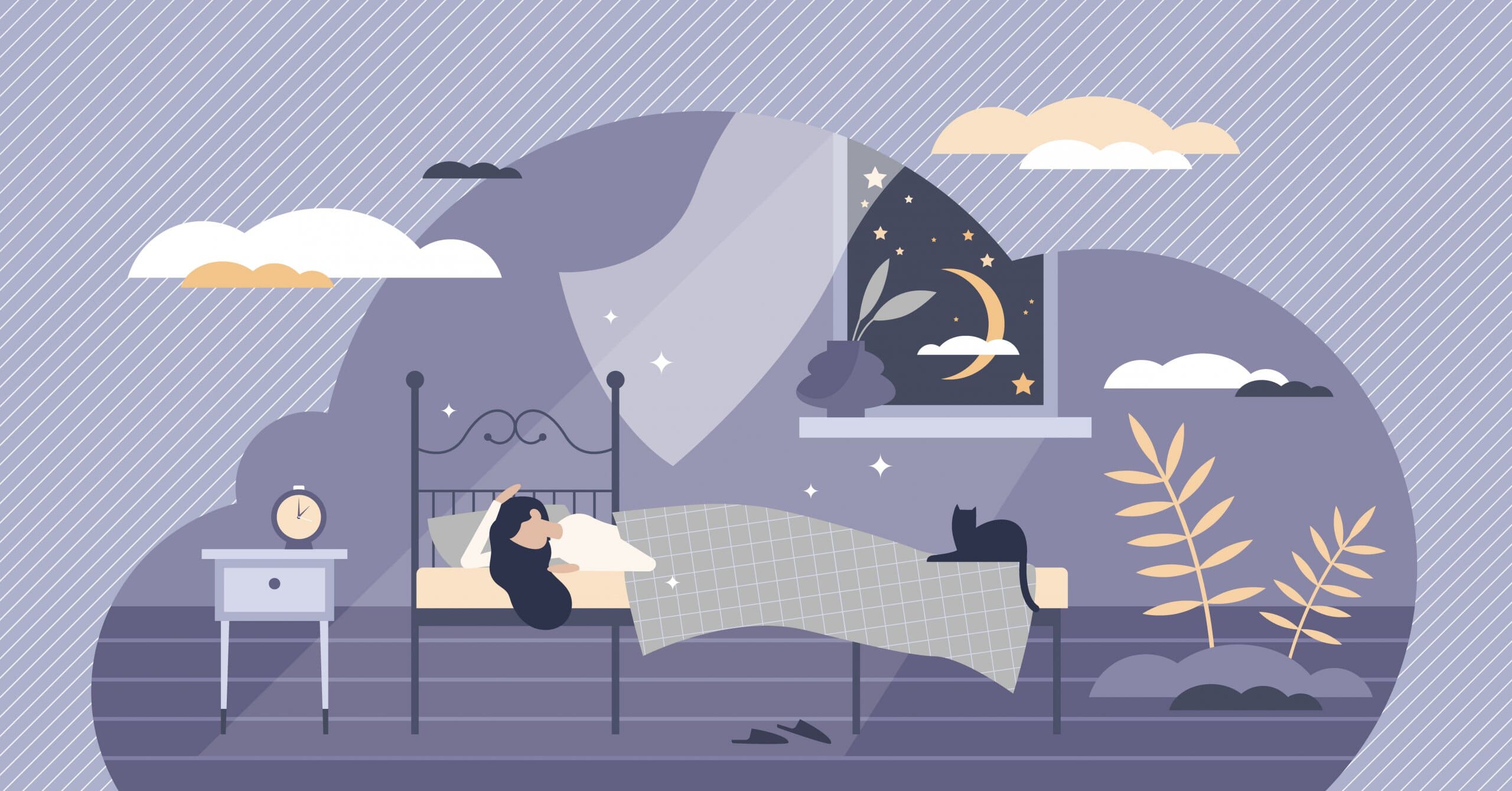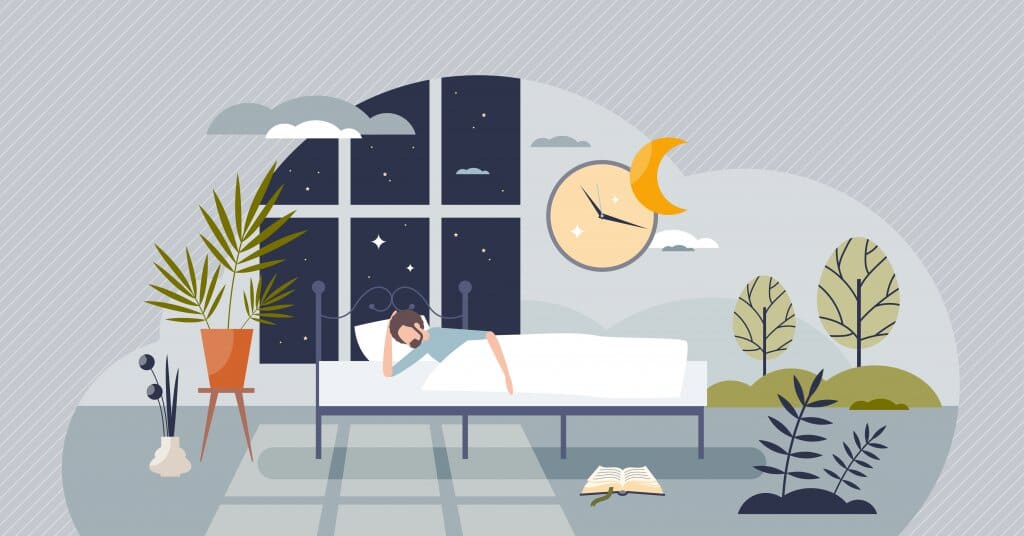Did you know that Mariah Carey sleeps with 20 humidifiers around her bed? She says it’s “like a steam room” in there! Luckily, you don’t have to go to such extreme lengths to get a good night’s sleep as diva Mariah.
We’ve formulated the perfect night time routine for you to follow to get the best sleep possible, waking up refreshed and rejuvenated the next morning. It can be hard to form new habits, but if you try to incorporate even one of these tips into your bedtime routine, you’re guaranteed to notice the benefits.
You might have heard of a few different bedtime routine trends and tips. If you haven’t, we’ll run you through a couple of our favourites, before detailing exactly what our sleep experts recommend you do before bed to feel as well-rested as possible.

The 10-3-2-1-0 Method
Explaining the basics of sleep hygiene, Dr. Jess Andrade introduced the 10-3-2-1-0 method as a step by step guide to preparing yourself for a flawless night’s sleep.
It goes as follows:
10 - Stop drinking caffeine 10 hours before you intend to sleep
Dr. Andrade explains that it takes ten hours for caffeine to clear from your bloodstream. By eliminating the stimulatory effects of caffeine completely, you’re much less likely to struggle to relax.
This might seem like a long time to go without a coffee fix, but Dr. Andrade insists it’s worth it if you want a better night’s sleep.
3 - No more big meals or alcohol 3 hours before bed
She explains that finishing your last meal and putting your glass of wine down a minimum of three hours before you head to bed is vital for a good night’s rest.
Not only will this reduce any likelihood of acid reflux, but also helps to regulate your sleep-wake cycle (your circadian rhythm). Have you ever tried to go to sleep with a full stomach? It can be uncomfortable, so let your body digest and break down any food or alcohol in good time.
2 - Finish up with work and other stimulating tasks 2 hours prior to sleep
Dr. Andrade explains that allowing your brain to relax for at least two hours before you try to get to sleep will make it so much easier.
Save any work you’re trying to get done for the next day - those emails will have to wait! Don’t get wrapped up in any stress-inducing tasks, allow your mind to rest, and your body will follow.
1 - Keep 1 hour before bed screen-time free
The blue light emitted from your phone or TV screen suppresses your melatonin production - the hormone needed for sleep. Blue light also tricks your brain into thinking it’s still daytime, rather than time for unwinding and settling down to sleep.
It’s no surprise then, that Dr. Andrade recommends putting all electronics to the side for one hour before bed.
0 - The amount of times you’ll need to hit snooze!
Dr. Jess Andrade explains that if you follow these simple steps, keeping to the times she recommends, you’ll be well rested enough to not have to press the snooze button on your alarm clock the next morning.

Cognitive Reshuffling
If you don’t want to spend so much time preparing for sleep, you can always try the cognitive reshuffling method once you’re already in bed.
Interestingly, cognitive reshuffling actually mirrors the way children fall asleep. Have you ever tried distracting yourself from anxious thoughts by filling your mind with nonsense? If not, Canadian cognitive scientist Luc Beaudoin suggests you give it a go.
- Put your favourite pyjamas on and get settled down into bed.
- Think of a completely random, emotionally neutral word that has at least five letters. Something like ‘chair’ ‘forest’ or ‘pencil’.
- Go through the word letter by letter, spelling it out in your head. With each letter, think of as many words starting with that letter as you can. For example, if you’ve chosen the word ‘forest’ you might start with ‘fairy’ and ‘fountain’.
- Imagine that word you’ve thought of. Build a clear image of your ‘fairy’ or ‘fountain’, then release that image and move on.
- Repeat this as many times as you can for each letter. If you can’t think of anything, just skip that letter and move onto the next.
Beaudoin states that with this method, you’ll soon be sleeping soundly. By distracting yourself from anxious thoughts, you’re much more likely to reduce any symptoms of insomnia.
It’s vital, however, that you choose words that don’t have too much significance to you. Words like ‘money’ or ‘office’ might conjure feelings of worry and stress, so stick to words that hold no real meaning to you.
What should you include in your bedtime routine?
MattressNextDay’s team of Sleep Experts have tried everything under the sun to get a better night’s sleep. Putting popular tricks like the 10-3-2-1-0 method to the test, to figuring out exactly what works for them, they’ve come together to formulate the optimal bedtime routine to offer you the perfect night’s sleep.
Get your sleep hygiene squeaky clean
Preparing your area and yourself before settling down is absolutely essential. An unmade bed, a messy room and lost pyjamas will not help you relax or entice you into bed.
Focusing on your sleep hygiene is massively important. Make sure the environment you’re going to be carrying out your bedtime routine in is clean and organised. We’d recommend making your bedroom as comfortable and as ‘you’ as possible. Whether you’re into incense and crystals, or snuggly pillows and fairy lights, make your bedroom a relaxation haven.
We definitely agree with Dr. Jess Andrade that you should set your electronics to the side. An hour before bedtime is ideal, as this will help your body recognise that it’s time to settle down.
Martin Seeley, the CEO of MattressNextDay and one of our Sleep Experts, says:
Putting your phone down ahead of bed will prevent you from ‘doomscrolling’. This is where you go down a rabbit hole looking at negative news articles that can induce worry and stress. These feelings directly link to isomnia, so steer clear of gloomy news stories before bed.
Take care of morning tasks ahead of time
Do you often find yourself rushing around in the mornings? Take the time during your bedtime routine to complete morning chores and prepare yourself for the next day. You’ll sleep much more soundly knowing everything is prepared, without overthinking about everything you need to do in the morning.
Lots of us lead very busy lives, so just do what you can. If possible, prepare a breakfast such as overnight oats that you can grab out of the fridge and take to work with you. If you don’t have that much time spare in the evening, simple things like leaving your keys in an easy to find place, or preparing your outfit and laying it out ready will save you heaps of time and stress when you wake up.
Definitely try not to leave chores for the morning, either. You might not be able to think of anything worse than doing the washing up or taking the bins out when you’re tired in the evening, but it’ll annoy you even more if you have to rush around doing it all in the morning.
Should you shower before bed?
To put it simply - yes, you should definitely consider showering before bed. In fact, our Sleep Experts recommend adding a shower as an integral part of your bedtime routine.
Scientists say that a sensation they’ve called the ‘warm bath effect’ can increase your body’s temperature, preparing it for when your body temperature naturally drops during sleep. A warm shower, therefore, helps to regulate this process, ensuring you don’t get too cold during the night, and stay at an optimal sleeping temperature instead.
A hot shower before bed can also signal to your brain that it’s time to sleep. The feeling of being warm and cosy will help you relax and unwind. Use a lavender scented shower gel and let the steam unclog your pores, removing built up dirt from during the day. For even more information on the best time to shower, read our guide on the reasons you should be showering at night.
Our post on natural sleep aids can tell you more about the benefits of lavender, as well as other essential oils and sleep aids you can incorporate into your bedtime routine.
But NEVER sleep with wet hair
Your hair is at its most fragile when wet, so it's way more likely to break and cause damage if you lay on it, tossing and turning, while it's still damp.
Sleeping with damp hair will also lead to knots, frizz and flyaways, making it harder to style in the morning.
What's more, the warmth and moisture from damp hair can lead to bacteria growth, which may cause acne on your scalp called pustules that can become itchy and painful.
The yeast associated with dandruff will also flourish in damp, warm conditions, so if you want to prevent a flaky scalp, we recommend drying your hair fully before bed.
Practising gratitude will help you sleep better and boost your mood
Practising gratitude before bed can be a powerful way to improve the quality of your sleep. When we focus on the things that we are thankful for, it can help shift our focus away from negative thoughts and worries, which can often keep us up at night.
Gratitude also has been shown to increase feelings of calmness and contentment, soothing your nervous system and enabling you to get a good night’s rest.
One way to practise gratitude before bed is to keep a gratitude journal. Take a few minutes each night to write down three things that you are grateful for. These could be big things, like a promotion at work, or small things, like a delicious meal or a beautiful sunset. By reflecting on the positive aspects of your life, you can help train your brain to focus on the good, rather than the bad.
Depression can seriously impact your quality of sleep - you can end up sleeping too much or not at all. Cognitive scientists say that by practising gratitude before bed, you can ease symptoms of depression, resulting in a better quality of sleep.
Experiments have shown that people who simply write down three good things that happened to them during the day before they go to sleep, see improvement in their overall mood and wellbeing.
Read our blog post on how mental health can affect your sleep to learn more about the relationship between mental illness and sleep quality, and other ways you can improve it.
Get lost in a book rather than your phone screen
Like in the 10-3-2-1-0 method, we absolutely recommend you quit electronic use at least one hour before you intend to sleep. It’s best if you don’t use your phone, tablet or laptop in bed at all, although we know that can be difficult.
However, by not using electronic devices in your bed, your brain will associate being under the covers with sleep, rather than being stimulated. Eventually you’ll find it much easier to unwind when you hit the hay if your brain doesn’t even consider picking up your phone when you’re in bed.
Reading a book before bed instead of watching TikToks or scrolling your Twitter feed has massive benefits for your quality of sleep.
Enveloping yourself in a totally different universe of fictional characters can take your mind off your own problems and worries. Anxiety is a leading cause of insomnia, so let your mind focus on the plot of the book rather than the plot of your own story - it's scientifically proven that reading reduces feelings of stress and anxiety.
In a 2021 study, 42% of people asked to read a book before bed found that their sleep quality improved drastically.
Getting lost in a story will have your mind ready to start dreaming. We recommend you don’t choose a book that will cause unnecessary brain stimulation, though, such as a horror or mystery novel that will make you want to stay up all night reading!
You can also read our post on how bedtime stories can benefit your little one - reading before bed is ideal for any age!

Take your skincare seriously
We're sure you already know that sleeping in make up is a big no no. Not only does it cause you to break out, but did you know sleeping in make up also causes premature aging?
Dirt and make up can actually cause 'environmentally-induced oxidatvie damage' according to doctors, which leads to the breakdown of your skin's natural barrier and eventually premature aging and wrinkles.
The ideal solution is to incorporate a skincare step into your nighttime routine. This can be a hard one to stick to, especially if you tend to be super tired come bedtime, but your reflection will thank you.
Try finding one or two products you love, and keep them out on your bathroom counter so you're less likely to forget to use them. A simple cleanser and moisturiser will be enough to start with, but try to stay away from make-up wipes, as they mostly just move make-up around your face, without cleansing properly.
For more tips on evening skincare, learn all about how sleep can benefit your skin!
Take it one step at a time
If you’re trying to get into a better bedtime routine, it’s important to not be disappointed if you can’t get something to work. Remember, researchers say it takes 2-3 months to form a new habit, so don’t be discouraged if you find yourself accidentally taking your phone to bed with you, or forgetting to do the washing up before bed!
Our team of Sleep Experts are dedicated to getting you the best night’s sleep possible. If you’re looking for other ways to improve your sleep, take a look at our other articles such as the 6 most effective sleep-enhancing teas to drink before bed.





